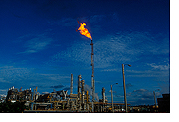|
||||||||||||||
Overview Humans
impact on all aspects of planet earth; this is self-evident and certainly
not new, nor is concern about it. Talk of holes in the ozone layer, acid
rain, Chernobyl and many forms of pollution have all generated considerable
interest across the globe. Impact on climate was very evident in the smogs
in London and Los Angeles last century and is so now in Beijing for example. Humans
impact on all aspects of planet earth; this is self-evident and certainly
not new, nor is concern about it. Talk of holes in the ozone layer, acid
rain, Chernobyl and many forms of pollution have all generated considerable
interest across the globe. Impact on climate was very evident in the smogs
in London and Los Angeles last century and is so now in Beijing for example.In all these instances, scientists have provided data and stimulated public response and we now live in a more eco-aware world with “green parties” and “friends of the earth”. The impact of man on the climate in terms of global warming through the greenhouse effect was first muted about a hundred years ago and became a “serious” issue to scientists certainly from the 1970s and spawned much research. This research has increased and continued to the present, with more and more scientists issuing warnings to seemingly little avail. However, by 1992 with the Earth Summit in Rio de Janeiro and in particular in 1997 at Kyoto, significant change was becoming evident: the scientists’ warnings were impacting on global communities and on global politics. Kyoto consolidated international responses and in turn led to e.g. the European Union Emission Trading Scheme (EU ETS) as a means of addressing the targets in the Kyoto protocol – targets demanding “demonstrable progress” by 2005. Kyoto and EU ETS are significant therefore not in terms of any significant success in themselves to date, but on reaching the key enabler to future success – the link to economics. It is against this background that the STERN Review commissioned by the Chancellor, delivered by an economist, Sir Nick Stern, is important. Today’s global economy is a market economy and as such until the scientists’ messages were translated into economic terms, prompted only limited response. The response may still be limited, but there is now a chance that it can be more. Rsection): |
||||||